Fleurs du Mal Magazine


Or see the index
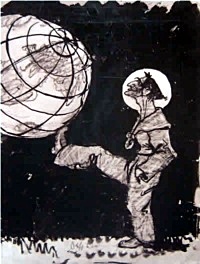
Joachim Ringelnatz
Kuttel Daddeldu
über Nobile
(Juli 1928)
So große Kerle gingen tot.
Gott weiß, was fern in höchster Not
Noch heute kämpft, vom Eis umklammert,
Für dieses Großmaul, das jetzt jammert
Um seinen angequetschten Zeh.
Wann hat ein Captain je in See
Als Erster seine Crew verlassen?!
Dem möcht ich in die Kiemen fassen!
Ach, daß sie den gerettet haben!
Er müßte, tief ins Eis gegraben,
Mit einem Lorbeerstock im Hintern,
Solang die Welt steht, überwintern.
Verflucht, ich kann nicht richtig beten,
Doch hab ich eine solche Wut.
Gott sei zu Amundsen recht gut.
Und wenn mir Nobile begegnet,
Will ich ihm das Gedärm zerkneten
Und ihn und sein ihm teures Leben
An andre Fäuste weitergeben,
So, daß er Luft und Wasser segnet.
Joachim Ringelnatz
(1883 – 1934)
Kuttel Daddeldu über Nobile
fleursdumal.nl magazine
More in: Archive Q-R, Joachim Ringelnatz
Romeo en Julia van Prokofiev is zonder twijfel één van de hoogtepunten uit de klassiek-romantische ballettraditie.
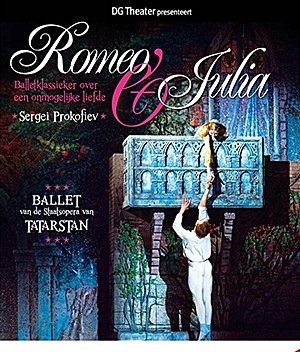 Met het beroemde verhaal van Shakespeare als basis, schetst deze voorstelling de geschiedenis van een onmogelijke liefde.
Met het beroemde verhaal van Shakespeare als basis, schetst deze voorstelling de geschiedenis van een onmogelijke liefde.
Romeo en Julia hebben hun hart aan elkaar verpand, maar omdat hun families al generaties lang ruzie hebben, kan het niks worden tussen de geliefden. Dus als ze trouwplannen maken, wordt het huwelijk aan alle kanten gedwarsboomd, met tragische gevolgen.
In de fantastische muziek van de beroemde componist Prokofiev weerklinken de hartstocht en dramatiek die deze choreografie verbeeldt.
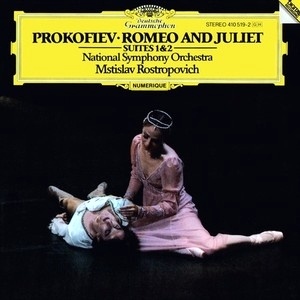 Met dans van wereldniveau brengt het ballet van de Staatsopera van Tatarstan dit ultieme liefdesverhaal in heel Europa met succes tot leven. Hun weelderige kostuums geven de voorstelling kleur en dynamiek. Ook de decors zijn indrukwekkend: die bieden een betoverende achtergrond voor onder meer de uitbundige feesttaferelen in het verhaal en natuurlijk de beroemde balkonscene, die het symbool werd van de romantiek.
Met dans van wereldniveau brengt het ballet van de Staatsopera van Tatarstan dit ultieme liefdesverhaal in heel Europa met succes tot leven. Hun weelderige kostuums geven de voorstelling kleur en dynamiek. Ook de decors zijn indrukwekkend: die bieden een betoverende achtergrond voor onder meer de uitbundige feesttaferelen in het verhaal en natuurlijk de beroemde balkonscene, die het symbool werd van de romantiek.
De passie van de dansers en de hartverscheurende ontmoetingen tussen de geliefden maken van deze voorstelling een aanrader voor alle generaties met een gevoelig hart.
Romeo en Julia
Nog te zien in theaters door heel Nederland
van december 2017 t/m februari 2018.
Meer info:
Wereldtheater.com
DG Theater
info@dgtheater.nl
+31 30 2844 770
fleursdumal.nl magazine
More in: # Music Archive, Art & Literature News, DANCE & PERFORMANCE, Shakespeare, William, THEATRE
Als erfolgreicher Autor des berühmten S. Fischer Verlags, dem er seit 1904 angehörte, war Hermann Hesse (1877-1962) in besonderer Weise mit Berlin verbunden, wenngleich er selbst nur ganz selten hier war.
 Die Machtübernahme durch die Nationalsozialisten hatte auch für Hesse, der seit 1924 wieder Schweizer Staatsbürger war und im Tessin lebte, weitreichende Konsequenzen, da ihn die Bindung an seinen Berliner Verlag in Abhängigkeit vom nationalsozialistischen Regime brachte, dessen Propagandisten ihn anfangs diffamierten und später ausmanövrierten.
Die Machtübernahme durch die Nationalsozialisten hatte auch für Hesse, der seit 1924 wieder Schweizer Staatsbürger war und im Tessin lebte, weitreichende Konsequenzen, da ihn die Bindung an seinen Berliner Verlag in Abhängigkeit vom nationalsozialistischen Regime brachte, dessen Propagandisten ihn anfangs diffamierten und später ausmanövrierten.
Einflussreiche emigrierte Publizisten indessen verurteilten aufs schärfste, dass Hesse nicht gegen die Veröffentlichung seiner Bücher und Texte in Deutschland vorging und sich nicht ausschließlich zur deutschen Exilliteratur bekannte.
Redakteure Schweizer Zeitungen wiederum warfen Hesse mangelndes Verständnis des Schweizer Antisemitismus vor, der Anfang 1936 eine Niederlassung in Zürich des ins Exil getriebenen Teils des S. Fischer Verlags unausgesprochen mit verhindert hatte.
Fokussiert auf die Jahre von 1933 bis 1947, thematisiert die Ausstellung anhand vieler bislang unbekannter Materialien die vielschichtigen Verflechtungen, die Hesse zwischen der Schweiz, der deutschen Emigration und der Diktatur in Deutschland buchstäblich „zwischen die Fronten“ geraten ließ.
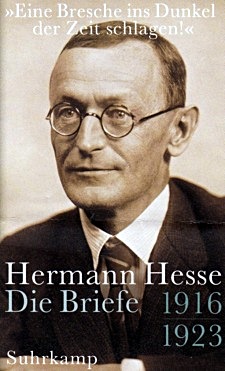 Anlass für die Ausstellung ist die Möglichkeit, aus dem umfangreichen, bislang unveröffentlichten Briefwechsel Hesses mit seinem jüngsten Sohn Martin (1911-1968) einige ausgewählte Briefe präsentieren und dem Zeitgeschehen zuordnen zu können. Im Frühjahr 1932 hatte Martin Hesse noch einen Vorkurs am Bauhaus in Dessau belegen können und erlebte dort die politische Radikalisierung Deutschlands.
Anlass für die Ausstellung ist die Möglichkeit, aus dem umfangreichen, bislang unveröffentlichten Briefwechsel Hesses mit seinem jüngsten Sohn Martin (1911-1968) einige ausgewählte Briefe präsentieren und dem Zeitgeschehen zuordnen zu können. Im Frühjahr 1932 hatte Martin Hesse noch einen Vorkurs am Bauhaus in Dessau belegen können und erlebte dort die politische Radikalisierung Deutschlands.
In die Schweiz zurückgekehrt, entwickelte Martin Hesse aus der am Bauhaus angeregten Beschäftigung mit der Fotografie eine professionelle Passion: Von ihm stammen die beeindruckenden Aufnahmen der Kunstdenkmäler des Kantons Bern und unzählige Fotos seines berühmten Vaters.
Die Ausstellung setzt mit einem Rückblick auf Hesses erste Frau Maria (Mia), geb. Bernoulli (1868-1963), ein, mit der er bis 1912 in Gaienhofen am Bodensee gelebt hatte. Maria Bernoulli gilt als die erste Schweizer Berufsfotografin, zusammen mit ihrer Schwester unterhielt sie von 1902 bis 1907 ein Fotoatelier in Basel.
Eine Ausstellung des Literaturhauses Berlin
Konzipiert von Lutz Dittrich mit Unterstützung durch Gunnar Decker und Volker Michels
Mitarbeit: Sebastian Januszewski
Ausstellungsgestaltung: unodue { (Costanza Puglisi und Florian Wenz)
Einen Folder mit umfangreichen Informationen über die Ausstellung finden Sie auch hier.
Die zur Ausstellung erscheinende Begleitpublikation
Zwischen den Fronten. Der Glasperlenspieler Hermann Hesse enthält einige ausgewählte Abdrucke aus dem Briefwechsel Hermann Hesses mit seinem Sohn Martin sowie Originalbeiträge von Jan-Pieter Barbian (Publizist), Gunnar Decker (Hesse-Biograph), Michael Kleeberg (Schriftsteller und Übersetzer) und Volker Michels (Hesse-Herausgeber).
In der Ausstellung erhältlich.
Hg. von Lutz Dittrich.
12.- Euro.
ISBN 978-3-926433-57-2
14 Dez – 11 Mär 2017
Grosser und Kleiner Saal
Ausstellung im Literaturhaus
Zwischen den Fronten.
Der Glasperlenspieler Hermann Hesse
LiteraturHausBerlin
Fasanenstraße 23
10719 Berlin
fleursdumal.nl magazine
More in: - Book News, - Book Stories, Archive G-H, Archive G-H, Art & Literature News, Hermann Hesse, Hesse, Hermann

Foto aan de kroegwand
Klaar voor de foto
het moment dat de jager als buit wordt geschoten
door een toerist, behangen met trofeeën, veroverd op buit
Gedroogde organen, tanden, vellen en poten
alles verraadt de geur van de dood
amuletten om de goden gunstig te stemmen
en middeltjes om de buit te lokken
pijlen en bogen schietklaar voor het moment van geluk
de resten van een geweer, als onderscheiding gedragen
zoals een analfabeet zijn pen als een fetisj meedraagt
rond de heupen gedrapeerd riet
als camouflage, met geur als lokspoor
Spiegeltjes schitteren op borst en rug
om ongezien aanvallers te laten schrikken
van hun eigen aanblik
Ton van Reen
Ton van Reen: De naam van het mes. Afrikaanse gedichten. In 2007 verschenen onder de titel: De straat is van de mannen bij BnM Uitgevers in De Contrabas reeks. ISBN 9789077907993 – 56 pagina’s – paperback
fleursdumal.nl magazine
More in: Archive Q-R, Reen, Ton van, Reen, Ton van, Ton van Reen
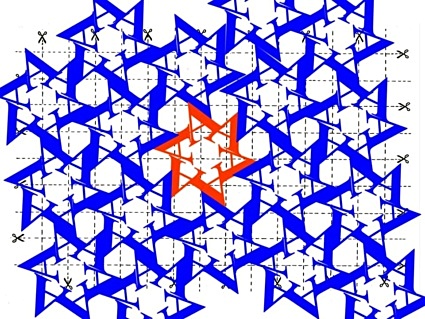
Sérgio Monteiro de Almeida
Poema visual: Presentation 5A (from the kaleidoscope series)
Sérgio Monteiro de Almeida, Curitiba, Brazil (1964).
Intermedia visual poet and conceptual artist
fleursdumal.nl magazine
More in: *Concrete + Visual Poetry K-O, Archive M-N, Sérgio Monteiro de Almeida
Ever since Emma read Pride and Prejudice, she’s been in love with Mr. Darcy and has regarded Jane Austen as the expert on all things romantic.
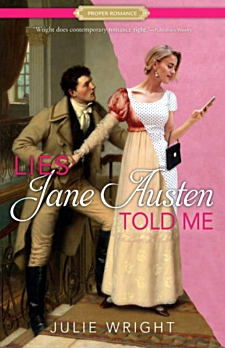 So naturally when Emma falls for Blake Hampton and he invites her home to meet his parents, she is positive an engagement is in her future. After all, Blake is a single man in possession of a good fortune, and thus must be in want of a wife.
So naturally when Emma falls for Blake Hampton and he invites her home to meet his parents, she is positive an engagement is in her future. After all, Blake is a single man in possession of a good fortune, and thus must be in want of a wife.
But when it turns out that what Blake actually wants is more of a hook-up than a honeymoon, Emma is hurt, betrayed, and furious. She throws herself deeper into her work as CMO of Kinetics, the fastest growing gym franchise in the nation. She loves her work, and she’s good at it, which is why she bristles when her boss brings in a consultant to help her spearhead the new facilities on the East Coast. Her frustration turns to shock when that consultant turns out to be Blake’s younger brother, Lucas. Emma is determined not to fall for Lucas, but as she gets to know him, she realizes that Lucas is nothing like his brother. He is kind and attentive and spends his time and money caring for the less fortunate.
What she can’t understand is why Lucas continues to try to push her back into Blake’s arms when he so clearly has fallen as hard for her as she has fallen for him. It isn’t until Lucas reveals to Emma that he was adopted into the Hampton family that she begins to understand his loyalty to Blake as well as his devotion to the child April-she is Lucas’s biological niece.
Emma opens up to Lucas about the feelings of abandonment she has harbored ever since she was a child and her mother left the family. As she helps Lucas deal with his past demons, she is able to exorcise some of her own.
Realizing that her love life is as complicated as anything Jane Austen could have dreamed up, Emma must find a way to let Blake know that it’s time for him to let her go and to let Lucas know it’s time for him to love her back.
Julie Wright wrote her first book when she was fifteen, and has since written twenty-three novels. She has a husband, three kids, a dog, and a varying amount of fish, frogs, and salamanders (depending on attrition). She loves writing, reading, traveling, speaking at schools, hiking, playing with her kids, and watching her husband make dinner.
Julie Wright
Lies Jane Austen Told Me
Published: 2017
Pages: 320
ISBN: 9781629723426
Publisher: Shadow Mountain
fleursdumal.nl magazine
More in: - Book News, - Bookstores, Archive A-B, Archive W-X, Art & Literature News, Austen, Jane, Austen, Jane, Jane Austen
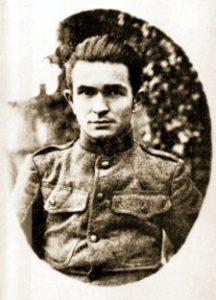
Aan Cendrars
Man loopt straat
luide stem tussen huizen
hij roept
klinkt klinker klaar
Blaise Blaise BLAIS –
se
gij zijt het
Cendrars
Paul van Ostaijen
(1896 – 1928)
Aan Cendrars
fleursdumal.nl magazine
More in: *Concrete + Visual Poetry K-O, Archive C-D, Archive O-P, Cendrars, Blaise, Ostaijen, Paul van, Paul van Ostaijen, Paul van Ostaijen
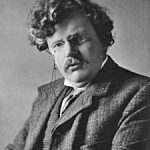
G.K. Chesterton
Lepanto
White founts falling in the Courts of the sun,
And the Soldan of Byzantium is smiling as they run;
There is laughter like the fountains in that face of all men feared,
It stirs the forest darkness, the darkness of his beard;
It curls the blood-red crescent, the crescent of his lips;
For the inmost sea of all the earth is shaken with his ships.
They have dared the white republics up the capes of Italy,
They have dashed the Adriatic round the Lion of the Sea,
And the Pope has cast his arms abroad for agony and loss,
And called the kings of Christendom for swords about the Cross.
The cold queen of England is looking in the glass;
The shadow of the Valois is yawning at the Mass;
From evening isles fantastical rings faint the Spanish gun,
And the Lord upon the Golden Horn is laughing in the sun.
Dim drums throbbing, in the hills half heard,
Where only on a nameless throne a crownless prince has stirred,
Where, risen from a doubtful seat and half attainted stall,
The last knight of Europe takes weapons from the wall,
The last and lingering troubadour to whom the bird has sung,
That once went singing southward when all the world was young.
In that enormous silence, tiny and unafraid,
Comes up along a winding road the noise of the Crusade.
Strong gongs groaning as the guns boom far,
Don John of Austria is going to the war,
Stiff flags straining in the night-blasts cold
In the gloom black-purple, in the glint old-gold,
Torchlight crimson on the copper kettle-drums,
Then the tuckets, then the trumpets, then the cannon, and he comes.
Don John laughing in the brave beard curled,
Spurning of his stirrups like the thrones of all the world,
Holding his head up for a flag of all the free.
Love-light of Spain–hurrah!
Death-light of Africa!
Don John of Austria
Is riding to the sea.
Mahound is in his paradise above the evening star,Lepanto
(Don John of Austria is going to the war.)
He moves a mighty turban on the timeless houri’s knees,
His turban that is woven of the sunsets and the seas.
He shakes the peacock gardens as he rises from his ease,
And he strides among the tree-tops and is taller than the trees;
And his voice through all the garden is a thunder sent to bring
Black Azrael and Ariel and Ammon on the wing.
Giants and the Genii,
Multiplex of wing and eye,
Whose strong obedience broke the sky
When Solomon was king.
They rush in red and purple from the red clouds of the morn,
From the temples where the yellow gods shut up their eyes in scorn;
They rise in green robes roaring from the green hells of the sea
Where fallen skies and evil hues and eyeless creatures be,
On them the sea-valves cluster and the grey sea-forests curl,
Splashed with a splendid sickness, the sickness of the pearl;
They swell in sapphire smoke out of the blue cracks of the ground,–
They gather and they wonder and give worship to Mahound.
And he saith, “Break up the mountains where the hermit-folk can hide,
And sift the red and silver sands lest bone of saint abide,
And chase the Giaours flying night and day, not giving rest,
For that which was our trouble comes again out of the west.
We have set the seal of Solomon on all things under sun,
Of knowledge and of sorrow and endurance of things done.
But a noise is in the mountains, in the mountains, and I know
The voice that shook our palaces–four hundred years ago:
It is he that saith not ‘Kismet’; it is he that knows not Fate;
It is Richard, it is Raymond, it is Godfrey at the gate!
It is he whose loss is laughter when he counts the wager worth,
Put down your feet upon him, that our peace be on the earth.”
For he heard drums groaning and he heard guns jar,
(Don John of Austria is going to the war.)
Sudden and still–hurrah!
Bolt from Iberia!
Don John of Austria
Is gone by Alcalar.
St. Michaels on his Mountain in the sea-roads of the north
(Don John of Austria is girt and going forth.)
Where the grey seas glitter and the sharp tides shift
And the sea-folk labour and the red sails lift.
He shakes his lance of iron and he claps his wings of stone;
The noise is gone through Normandy; the noise is gone alone;
The North is full of tangled things and texts and aching eyes,
And dead is all the innocence of anger and surprise,
And Christian killeth Christian in a narrow dusty room,
And Christian dreadeth Christ that hath a newer face of doom,
And Christian hateth Mary that God kissed in Galilee,–
But Don John of Austria is riding to the sea.
Don John calling through the blast and the eclipse
Crying with the trumpet, with the trumpet of his lips,
Trumpet that sayeth ha!
Domino gloria!
Don John of Austria
Is shouting to the ships.
King Philip’s in his closet with the Fleece about his neck
(Don John of Austria is armed upon the deck.)
The walls are hung with velvet that is black and soft as sin,
And little dwarfs creep out of it and little dwarfs creep in.
He holds a crystal phial that has colours like the moon,
He touches, and it tingles, and he trembles very soon,
And his face is as a fungus of a leprous white and grey
Like plants in the high houses that are shuttered from the day,
And death is in the phial and the end of noble work,
But Don John of Austria has fired upon the Turk.
Don John’s hunting, and his hounds have bayed–
Booms away past Italy the rumour of his raid.
Gun upon gun, ha! ha!
Gun upon gun, hurrah!
Don John of Austria
Has loosed the cannonade.
The Pope was in his chapel before day or battle broke,
(Don John of Austria is hidden in the smoke.)
The hidden room in man’s house where God sits all the year,
The secret window whence the world looks small and very dear.
He sees as in a mirror on the monstrous twilight sea
The crescent of his cruel ships whose name is mystery;
They fling great shadows foe-wards, making Cross and Castle dark,
They veil the plumèd lions on the galleys of St. Mark;
And above the ships are palaces of brown, black-bearded chiefs,
And below the ships are prisons, where with multitudinous griefs,
Christian captives sick and sunless, all a labouring race repines
Like a race in sunken cities, like a nation in the mines.
They are lost like slaves that sweat, and in the skies of morning hung
The stair-ways of the tallest gods when tyranny was young.
They are countless, voiceless, hopeless as those fallen or fleeing on
Before the high Kings’ horses in the granite of Babylon.
And many a one grows witless in his quiet room in hell
Where a yellow face looks inward through the lattice of his cell,
And he finds his God forgotten, and he seeks no more a sign–
(But Don John of Austria has burst the battle-line!)
Don John pounding from the slaughter-painted poop,
Purpling all the ocean like a bloody pirate’s sloop,
Scarlet running over on the silvers and the golds,
Breaking of the hatches up and bursting of the holds,
Thronging of the thousands up that labour under sea
White for bliss and blind for sun and stunned for liberty.
Vivat Hispania!
Domino Gloria!
Don John of Austria
Has set his people free!
Cervantes on his galley sets the sword back in the sheath
(Don John of Austria rides homeward with a wreath.)
And he sees across a weary land a straggling road in Spain,
Up which a lean and foolish knight for ever rides in vain,
And he smiles, but not as Sultans smile, and settles back the blade….
(But Don John of Austria rides home from the Crusade.)
G. K. Chesterton (1874 – 1936)
Poetry: Lepanto
fleursdumal.nl magazine
More in: Archive C-D, Chesterton, Gilbert Keith, G.K. Chesterton
The T. S. Eliot Prize for Poetry was inaugurated in 1993 to celebrate the Poetry Book Society’s 40th birthday and honour its founding poet.
Described as ‘the prize most poets want to win’ (Sir Andrew Motion, former Poet Laureate) and ‘the world’s top poetry award’ (Independent), it is awarded annually to the author of the best new collection of poetry published in the UK and Ireland.
The T. S. Eliot Prize for Poetry was inaugurated in 1993 to celebrate the Poetry Book Society’s 40th birthday and honour its founding poet.

To mark the 25th anniversary of the T. S. Eliot Prize, the T. S. Eliot Foundation has increased the winner’s prize money to £25,000. Judges Bill Herbert (Chair), James Lasdun and Helen Mort have chosen the shortlist from a record 154 poetry collections submitted by publishers:
Tara Bergin – The Tragic Death of Eleanor Marx (Carcanet) PBS Autumn Recommendation
Caroline Bird – In these Days of Prohibition (Carcanet)
Douglas Dunn – The Noise of a Fly (Faber & Faber) PBS Autumn Recommendation
Leontia Flynn – The Radio (Cape Poetry)
Roddy Lumsden – So Glad I’m Me (Bloodaxe)
Michael Symmons Roberts – Mancunia (Cape Poetry) PBS Autumn Recommendation
Robert Minhinnick – Diary of the Last Man (Carcanet)
James Sheard – The Abandoned Settlements (Cape Poetry) PBS Spring Choice
Jacqueline Saphra – All My Mad Mothers (Nine Arches Press)
Ocean Vuong – Night Sky with Exit Wounds (Cape Poetry) PBS Summer Recommendation
Chair Bill Herbert said:
“This was a very strong year, and it was a privilege to read so many books that possessed as well as intrigued us; our shortlist explores grief, pleasure, place and history in a formidable variety of ways.”
The T. S. Eliot Prize is run by The T. S. Eliot Foundation. This is the richest prize in British poetry, with the winning poet receiving a cheque for £25,000 and the shortlisted poets each receiving £1,500.
The T. S. Eliot Prize Shortlist Readings will take place on Sunday 14th January 2018 in Southbank Centre’s Royal Festival Hall. The shortlist readings are the largest annual poetry event in the UK and will be hosted once again by Ian McMillan. Tickets are now on sale from Southbank Centre’s ticket office on 0203 879 9555 or via www.southbankcentre.co.uk/literature.
The winner of the 2017 Prize will be announced at the Award Ceremony on Monday 15th January 2018, where the winner and the shortlisted poets will be presented with their cheques. This continues the tradition started by Mrs Valerie Eliot, who provided the prize money from the inception of the Prize.
Last year’s winner was Jacob Polley for Jackself (Picador). The judges were Ruth Padel (Chair), Julia Copus and Alan Gillis.
fleursdumal.nl magazine
More in: Archive E-F, Awards & Prizes, Eliot, T. S., Literary Events, Ocean Vuong

Klaus Schmidt’s discovery
His lifetime work discovered him in the dust of Turkey,
the lifeline linked his work from now on until his end.
The wedding night of civilisation is his quoted words.
Carvings muted utter silences and revealed themselves.
Why waste time with this profit unto the wasted land
creeping overall the flickering darkness inhabiting us?
Man’s noises removed, the sand drenched and camouflaged
taking away in its grains the self-importance of all before.
But in the over awing wonders of politics and time’s line
the superstitious crept in niggling fear of what was not know
and gazed at him wrought in stone in the super-natural;
before the ox pulled wood to cut and plough,
before deserts, before we ourselves knew nothing still.
Numbers and letters farmed us as well
and now we have grown tall and proud in ourselves.
The sand spewed over the circles of carvings and settled.
We seek crumbs of proof if proof is needed of ourselves.
20.04.08
Vincent Berquez
Vincent Berquez is a London–based artist and poet
fleursdumal.nl magazine
More in: Archive A-B, Berquez, Vincent, Vincent Berquez
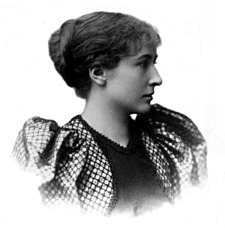
The Shadow-Child
Why do the wheels go whirring round,
Mother, mother?
Oh, mother, are they giants bound,
And will they growl forever?
Yes, fiery giants underground,
Daughter, little daughter,
Forever turn the wheels around,
And rumble-grumble ever.
Why do I pick the threads all day,
Mother, mother,
While sunshine children are at play?
And must I work forever?
Yes, shadow-child; the live-long day,
Daughter, little daughter,
Your hands must pick the threads away,
And feel the sunshine never.
Why do the birds sing in the sun,
Mother, mother,
If all day long I run and run,
Run with the wheels forever?
The birds may sing till day is done,
Daughter, little daughter,
But with the- wheels your feet must run—
Run with the wheels forever.
Why do I feel so tired each night,
Mother, mother?
The wheels are always buzzing bright;
Do they grow sleepy never?
Oh, baby thing, so soft and white,
Daughter, little daughter,
The big wheels grind us in their might,
And they will grind forever.
And is the white thread never spun,
Mother, mother?
And is the white cloth never done,
For you and me done never?
Oh yes, our thread will all be spun,
Daughter, little daughter,
When we lie down out in the sun,
And work no more forever.
And when will come that happy day,
Mother, mother?
Oh, shall we laugh and sing and play
Out in the sun forever?
Nay, shadow-child, we’ll rest all day,
Daughter, little daughter,
Where green grass grows and roses gay,
There in the sun forever.
Harriet Monroe
(1860 – 1936)
The Shadow-Child
fleursdumal.nl magazine
More in: Archive M-N, Monroe, Harriet
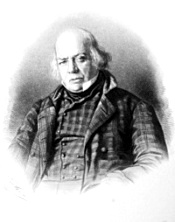
Pierre-Jean de Béranger
Les souvenirs du peuple
On parlera de sa gloire
Sous le chaume bien longtemps.
L’humble toit, dans cinquante ans,
Ne connaîtra plus d’autre histoire.
Là viendront les villageois
Dire alors à quelque vieille
Par des récits d’autrefois,
Mère, abrégez notre veille.
Bien, dit-on, qu’il nous ait nui,
Le peuple encor le révère,
Oui, le révère.
Parlez-nous de lui, grand-mère ;
Parlez-nous de lui. (bis)
Mes enfants, dans ce village,
Suivi de rois, il passa.
Voilà bien longtemps de ça ;
Je venais d’entrer en ménage.
À pied grimpant le coteau
Où pour voir je m’étais mise,
Il avait petit chapeau
Avec redingote grise.
Près de lui je me troublais,
Il me dit :
Bonjour, ma chère,
Bonjour, ma chère.
– Il vous a parlé, grand-mère !
Il vous a parlé !
L’an d’après, moi, pauvre femme,
À Paris étant un jour,
Je le vis avec sa cour
Il se rendait à Notre-Dame.
Tous les coeurs étaient contents ;
On admirait son cortège.
Chacun disait : Quel beau temps !
Le ciel toujours le protège.
Son sourire était bien doux ;
D’un fils Dieu le rendait père,
Le rendait père.
– Quel beau jour pour vous, grand-mère !
Quel beau jour pour vous !
Mais, quand la pauvre Champagne
Fut en proie aux étrangers,
Lui, bravant tous les dangers,
Semblait seul tenir la campagne.
Un soir, tout comme aujourd’hui,
J’entends frapper à la porte ;
J’ouvre, bon Dieu ! c’était lui
Suivi d’une faible escorte.
Il s’assoit où me voilà,
S’écriant : Oh ! quelle guerre !
Oh ! quelle guerre !
– Il s’est assis là, grand-mère !
Il s’est assis là !
J’ai faim, dit-il ; et bien vite
Je sers piquette et pain bis
Puis il sèche ses habits,
Même à dormir le feu l’invite.
Au réveil, voyant mes pleurs,
Il me dit : Bonne espérance !
Je cours de tous ses malheurs
Sous Paris venger la France.
Il part ; et comme un trésor
J’ai depuis gardé son verre,
Gardé son verre.
– Vous l’avez encor, grand-mère !
Vous l’avez encor !
Le voici. Mais à sa perte
Le héros fut entraîné.
Lui, qu’un pape a couronné,
Est mort dans une île déserte.
Longtemps aucun ne l’a cru ;
On disait : Il va paraître.
Par mer il est accouru ;
L’étranger va voir son maître.
Quand d’erreur on nous tira,
Ma douleur fut bien amère !
Fut bien amère !
– Dieu vous bénira, grand-mère ;
Dieu vous bénira. (bis)
Pierre-Jean de Béranger (1780-1857)
Les souvenirs du peuple
Toutes les chansons de Béranger (1843)
fleursdumal.nl magazine
More in: Archive A-B, Béranger, Pierre-Jean de
Thank you for reading Fleurs du Mal - magazine for art & literature